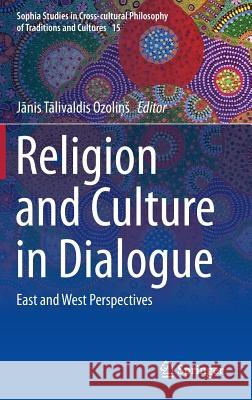Religion and Culture in Dialogue: East and West Perspectives » książka



Religion and Culture in Dialogue: East and West Perspectives
ISBN-13: 9783319257228 / Angielski / Twarda / 2016 / 225 str.
Religion and Culture in Dialogue: East and West Perspectives
ISBN-13: 9783319257228 / Angielski / Twarda / 2016 / 225 str.
(netto: 185,26 VAT: 5%)
Najniższa cena z 30 dni: 191,40 zł
ok. 20 dni roboczych.
Darmowa dostawa!
This volume addresses the issue of the human encounter with the Mystery of God and the purpose of human life.
1. Introduction – Jānis T. Ozoliņš (Australian Catholic University, Australia).- 2. Proglomena: Globalisation, Culture and Diversity – Jānis T. Ozoliņš (Australian Catholic University, Australia).- Part I – The Nature of Belief.- 3. I hope I believe in God – Bernadette Tobin (Australian Catholic University, Australia).- 4. Ethical Beliefs – Peter Drum (Australian Catholic University, Australia).- 5. Faith, Philosophy and the Elemental: Beyond Polarisation and Synthesis – Richard Colledge (Australian Catholic University, Australia).- Part 2 – Dialogues between Culture and Tradition.- 6. Reason, Interpreting across Boundaries and the Nature of Dialogue – John Quilter (Australian Catholic University, Australia).- 7. Aquinas’ Natural Law Versus Ethical and Cultural Pluralism – John Knasas (University of St. Thomas, Houston, Texas, United States).- Part 3 - Eastern Perspectives on God and Ethics.- 8. God and Conceptions of Immanence and Transcendence in Aquinas and Mèngzǐ - Jānis T. Ozoliņš (Australian Catholic University, Australia).- 9. The Confucian Filial Duty To Care (Xiao 孝) For Elderly Parents – Brian Mooney and John N. Williams (Singapore Management University, Singapore).- 10. A Daughter's Filiality, A Courtesan's Moral Propriety and a Wife's Conjugal Love: Rethinking Confucian Ethics for Women in the Tale of Kiều (Truyện Kiều) – Jonathan Y. Tan (Case Western Reserve University, Ohio, United States).- Part 4 – Human Dignity and Rights.- 11. The Patristic Notion of Person and its Importance for Modern Culture – Dan Chițoiu (Alexander Cusa University, Iasi, Romania).- 12.Questioning Human Dignity: The Dimensions of Dignity Model as a Bridge between Cosmopolitanism and the Particular – David G. Kirchhoffer (Australian Catholic University, Australia).- 13.Values, Culture and Models of Human Rights – William Sweet (St. Francis Xavier University, Antigonish, Canada).- 14. Life Experience, Values and Education – Maija Kūle (University of Latvia, Latvia).
Jānis (John) Tālivaldis Ozoliņš, M.Sc., Dip. Ed., Ph.D. (Melb.), G. Dip. Ed. Admin. (Deakin), MACE, FHERDSA, is Professor of Philosophy, Deputy Chair of the Academic Board at Australian Catholic University and Chair, Courses and Academic Quality Committee. He was Head of School of Philosophy (National) (1999-2010) and was Executive Dean (Acting) (2009) and Associate Dean, Teaching, Learning and International (Acting) (2009), in the Faculty of Theology and Philosophy at the Australian Catholic University. He was also Foundation Head of the Graduate School for Research in Philosophy and Theology (2005-2007). He is an elected professorial member of the Academic Board of the University (2009-present) and served on the University Senate, the governing body of the University, from 2004-2006. He is a permanent Honorary Fellow of the Institute of Philosophy and Sociology, University of Latvia and was Inaugural Crawford Miller Visiting Fellow at St. Cross College, Oxford in 2007. He has also been a Visiting Researcher at the University of Exeter, Visiting Professor at University of St. Thomas, Houston, Texas and Visiting Professor at Wuhan University, China. He is a Fellow of the Higher Education Research and Development Society of Australasia and served as President of the Philosophy of Education Society of Australasia from 2006 to 2009. He is a Fellow of the Philosophy of Education Society of Australasia.
This volume addresses the issue of the human encounter with the Mystery of God and the purpose of human life. It explores major themes from diverse cultural and philosophical traditions, starting with questions about the possibility of belief in God, His transcendence as seen in both East and West, and ending with questions about ethics and about personhood, human dignity and human rights. Taking an eclectic approach, the chapters in this book each uniquely address aspects of the human encounter with the Mystery of God, drawing from specific cultures and traditions, and using a particular philosophical and theological style. Together, the chapters provide a fresh approach and a synergy that ensures that each topic contributes something new to the dialogue between religion and culture.
1997-2024 DolnySlask.com Agencja Internetowa
KrainaKsiazek.PL - Księgarnia Internetowa










